

Mushrooms absorb moisture very rapidly and are almost impossible to dry out once they’ve been wet. This makes them soggy and unappetizing. If you feel that you need to clean your mushrooms, be sure to use a dry paper towel instead. Loose dirt or debris can also be shaken off.
2. Pre-washed salads
Packaged salads usually have a label on them stating if they’ve been washed prior to packaging. This means that you can save time and water by not washing them again. Note that a food-grade sanitizing agent, such as hydrogen peroxide or chlorine, is often used in pre-washing. If you’re not comfortable with that, then go ahead and give your salad a little rinse.

Eggs produced in the United States are washed using machines that shampoo them with soap and water. This removes their natural protective coating, as well as any traces of salmonella bacteria. American eggs need to be kept refrigerated to ensure their freshness as a result. In Europe, the situation is different. Chickens are usually vaccinated against salmonella, allowing their eggs to be stored at room temperature, thus keeping them fresh for much longer.
4. Chicken
Although it might seem sensible to wash poultry prior to cooking it, it can actually increase your chances of getting sick due to the likelihood of spreading harmful bacteria all over its surface. The only way to truly kill bacteria present on raw poultry is to cook it thoroughly.

Raw fish is much the same as poultry – washing it will likely result in harmful bacteria being spread all over its surface, as well as kitchen surfaces that will likely come into contact with other food. Remove the scales from a fish if a recipe calls for it, but leave it unrinsed to prevent germs from breeding.
6. Red meat
Washing red meat is just as risky as washing poultry or fish, but it can also ruin its quality. The added moisture from the water will create steam, affecting the meat’s taste. You should pat it down with a paper towel to remove excess moisture from cooking. Marinating the meat in the fridge will also prevent any liquid from spreading onto countertops or food.

Turkey should only be washed if it was brined, and the same applies to meat and poultry. Washing turkey if it isn’t brined can result in the spread of harmful bacteria around your kitchen and sink.
8. Packaged quinoa
If you’ve ever bought quinoa in bulk, you’ll know that it can have a slightly bitter taste if it isn’t washed. This taste is due to saponins, which are natural compounds that are designed to keep birds and insects from eating quinoa in the wild. Pre-packaged quinoa, however, has usually been pre-washed. A pre-wash means that the saponins have been removed and that the quinoa is ready to cook.

Despite some people being inclined to wash pasta prior to cooking it, doing so just removes the starches from the outside of it. These starches help sauce stick to it and also provide flavor. Seeing as packaged pasta is highly unlikely to be harboring harmful bacteria, there isn’t really a need to wash it. Skip the rinse and put it straight in a boiling pan of water.
10. Certain types of rice
Whether you should rinse the rice you want to cook or not actually depends on a number of factors, with the primary one being whether it’s imported (some imported rice is processed with talc or rice powder to give it a whiter appearance). In reality, washing rice has more downsides than positives, such as removing the natural starches that coat its surface, and negatively affecting the creaminess of a finished dish like risotto.

These Financial Resolutions Are Definitely Ones to Keep
We all tend to make resolutions as one year fades away and a new one approaches. Here are 10 financial resolutions that are worth keeping.
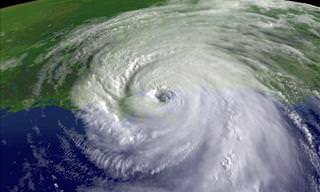
Hurricane Season is Now In Full Swing. Are You Prepared?
Hurricanes are violent tropical storms that often form in the Atlantic Ocean. Find out all about them and how to prepare for them if you live in their path.

Be Sure to Read This if You're Planning a Cookout Soon!
Most people love a good cookout, but that doesn't mean that mistakes don't get made when grilling. Here are 12 common grilling mistakes that everyone makes.

This Is Why It's a Bad Idea to Go to Bed With Wet Hair
Hair is at its most fragile when it's wet, not to mention that it can give rise to dandruff and bacterial growth. Here's why you should dry it after washing.

5 Turmeric-Based Facial Masks For Removing Hair
Turmeric is a wonderful spice from India that has a whole myriad of different applications. Here's how to make 5 turmeric-based masks for unwanted hair removal.

Maintain Your Credibility By Avoiding the Following Words
There are certain words that many of us tend to use habitually. Unfortunately we use them to our detriment, as they harm our credibility. Find out more.

5 Delicious and Healthy Recipes You Can Make with Beets
Recipes centered around beetroot

We Bet You've Never Tasted Potatoes As Delicious As These
These are the best potatoes you have ever tasted!
 4:51
4:51
A New Delicious Method to Cook Potatoes You Must See!
This new method of cooking potatoes is so simple, but it gives you that perfect golden crust every time. It very quickly became my new favorite!
 2:45
2:45
The Yummiest Donuts You’ve Never Had Before!
Ever tried bubble donuts? They are soft, small, delicious, and super easy to make. Follow the recipe here...
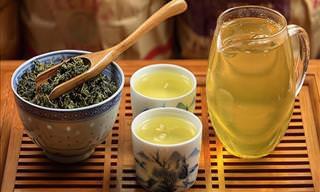
Tea Collection: Health Benefits, Uses and Recipes!
You'll find here no less than 11 guides to tea, from terrific health benefits you didn't know about to using it around the house for excellent life hacks.

Everything You Wanted to Know About BREAD
We decided to compile all the essential articles about bread, as well as a few easy and varied bread recipes into one collection, take a look
 10:12
10:12
This Soft Japanese Milk Bread Just Melts in the Mouth
Ever tried Japanese milk bread? It's just so soft and yummy...
 9:06
9:06
Learn How to Make the Irresistible Spanish Garlic Zucchini
Once you make this delicious Spanish dish, you won't be able to resist having it every weekend.

Improve Your Dessert Time With These 4 British Classics!
American pie sure is delicious, but when it comes to baking incredibly tasty desserts, the Brits come well out on top. Here are 4 delicious British desserts.

Eat These Foods for Breakfast If You're Diabetic
Breakfast is a very important meal of the day, even more so if you're diabetic. Here are 8 healthy breakfast options for those who suffer from diabetes.

Discover How to Reheat Any Leftovers in the Optimal Way
Learn the ideal way to reheat any kind of meal with this comprehensive guide.
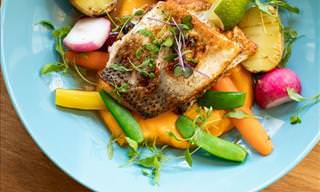
Learn Your Fish: 9 Common Types and How To Prepare Them
Do you think that choosing and cooking fish is a hassle? Let us change your mind by teaching you to distinguish between 9 fish varieties

This Pea Soup Recipe is One of the Best Around!
This recipe will show you how to make a delicious pot of pea soup.
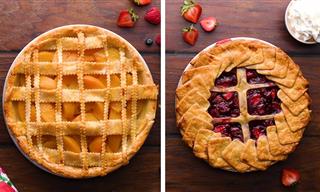 9:23
9:23
12 Pie Tricks Any Baker Should Try
Whether you’re a beginner or a seasoned baker, these useful tricks and hacks are sure to take your pie to the next level!
 12:04
12:04
The Delightful Russian Breakfast You Never Knew About
Learn how to make Syrniki, a delicious Russian breakfast of cheese pancakes.
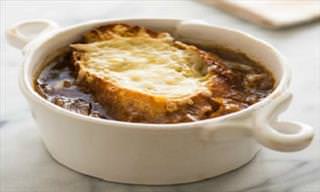
A French Onion Soup to Warm Even the Coldest of Nights
This recipe will show you how to make a delicious and hearty French onion soup that'll warm even the coldest of days.

Make 3 Easy Bread Loaves Using One Simple Dough!
In this video, the talented Mr. Lagerstrom will show you how to make three different versions of easy rustic bread using just one simple dough recipe.

2 Delicious Ways to Use Up Overripe Apples
So you bought a bunch of apples and find out that they’re all sandy or mushy. Now what? Before you decide to toss them into the trashcan, read this.
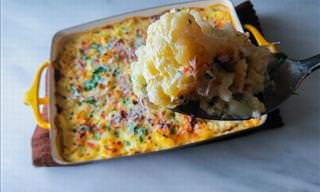
This Cauliflower Casserole is Comfort Food at its Best
Learn how to make your next favorite casserole recipe, using cauliflower and cheese.
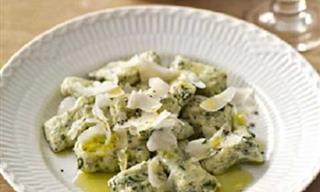
2 Authentic and Hearty Italian Recipes You've Got To Try
These are our favorite ways to prepare, savor and enjoy the best of Italian food.

This Exquisite Risotto is a Seafood Lover's Dream
This recipe will show you how to make a delicious and hearty seafood risotto.
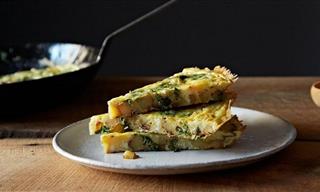
Three Terrific Recipes for Tasty and Healthy Root Vegetables
The following three recipes will teach you how to utilize lesser-known parts of a variety of wonderful root vegetables, earning you plenty of compliments and praise.

How to Use Powdered Peanut Butter in Your Recipes
Peanut butter powder can be used in many more ways than just making a sandwich. Here are a few recipes you will love.

Freeze These 13 Foods to Improve Their Taste
Did you know that these foods taste even better after freezing? Since your freezer is always on, you might as well make good use of these delicious tips!
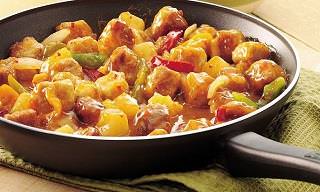
Delicious Sweet and Sour Pork That'll Melt in Your Mouth
This recipe will show you how to make a delicious sweet and sour pork that will leave your taste buds tingling.

7 Heavenly Dishes That Use Eggs to Delight You
Try your hand at one of these seven innovative and delicious egg-based recipes both you and your guests will love.

What You Need to Know About Different Types of Onions!
Red, yellow, and white onions are all slightly different when it comes to their flavor and texture. Read on to find out more.

The Perfectly Seared Steak: All You Need to Know
Now that its winter, our steak cooking options are fairly limited to the stove and oven, but this isn’t a bad thing...
 14:59
14:59
6 Unique Italian-Inspired Dinner Recipes You Must Try
These Italian-inspired dishes have a unique twist that makes them even more amazing!
 3:07
3:07
A Homemade Carrot Jam Recipe That’s Great for Your Health
Want to try a jam that's yummy but also super healthy? Then try out this delicious carrot jam recipe.

Wake Up to This Heavenly Breakfast Recipe
This heavenly treat combines all of your favorite breakfast ingredients

Great Options for Yummy Cheese Sandwiches
24 options to to turn your regular grilled cheese sandwich into an amazing dish.

9 Ice Cream Recipes You Can Make with a Food Processor
9 easy, healthier ice cream recipes that you can prepare in a food processor.
 13:59
13:59
I Never Knew You Could Make So Many Yummy Things With Eggs
If you're having an egg craving but are tired of the same old omelette, these 36 recipes are just what you need to shake things up
 4:16
4:16
Turn a Regular Egg Into Scrumptious Mini Fried Eggs
Check out this great video tutorial that'll take your eggs and turn them into a mini fried treat!

3 Winning Banana-Based Delicacies Everyone Will Love
From creamy puddings to decadent cakes and vegan cookies, these dishes showcase the banana's endless possibilities.

You Won't Believe What This Healthy Bread is Made of...
Wow, have you tried these new veggie flatbread recipes?! They are healthy, tasty, gorgeous and easy. Those are a few of my favorite things.

How to Make a Delicious Earthquake Cake
This Earthquake Cake isn't the best looking cake out there, but it is certainly one the tastiest. Follow this recipe and see for yourself!

These Delicious Cookies Contain a Secret Ingredient...
This is a cookie recipe with a difference. In fact, there's a single secret ingredient hat makes all the difference. Learn how to make these cookies today.

31 Quick and Easy Snacks That Have Less Than 100 Calories Each!
The following tasty and simple-to-make healthy snacks are just what you need to treat your cravings without ever tipping the 100 calorie line.

Have You Tried the Crunchiest Fried Chicken of All Time?
Everybody loves fried chicken, but no one has ever made chicken as crunch as this! Have a look at what surprising secret ingredient makes this chicken so good.
To enable your Ad-Free Subscription, please fill the fields below
Your subscription was successful, now you can enjoy an ad-free experience!! Note: To make sure you get no ads, please make sure to log in to your account. If you are logged in already, then refresh the page. The subscription can be cancelled at any time.


